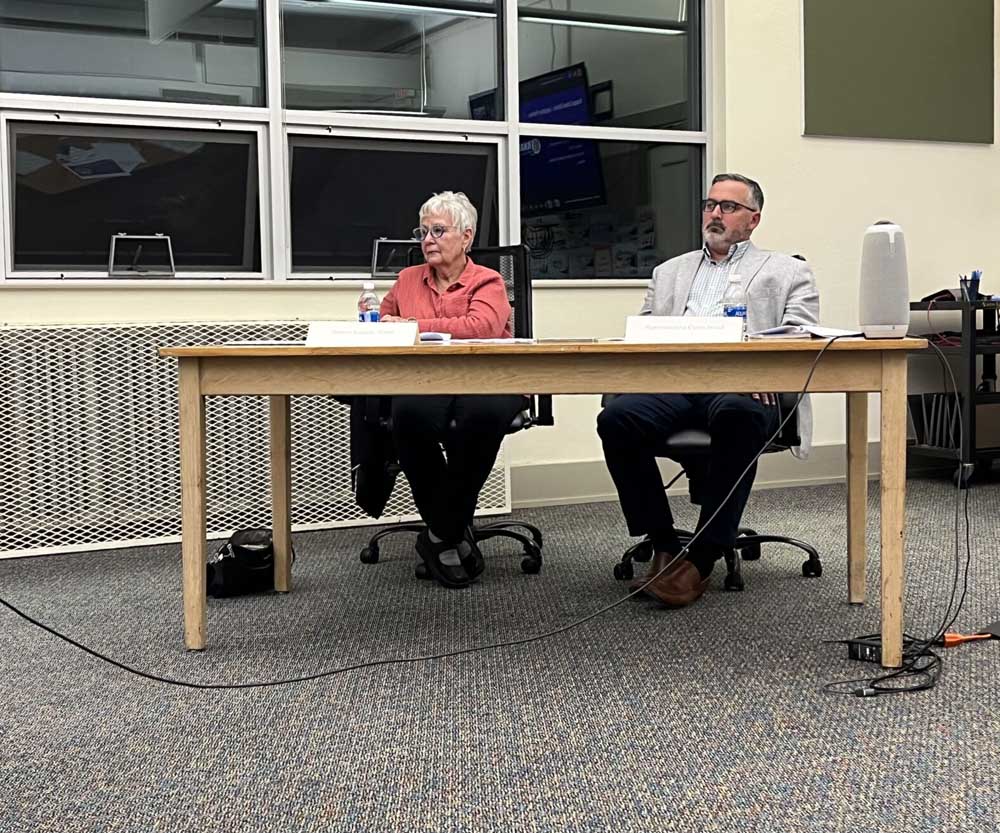Educators press lawmakers for support
Published 3:49 pm Monday, December 23, 2024

- State Sen. Suzanne Weber and state Rep. Cyrus Javadi appeared Dec. 18 at Capt. Robert Gray School in Astoria.
The Astoria School District is calling on state legislators to advocate for increased support for education going into the 2025 legislative session.
On Dec. 18, dozens of teachers, staff and parents gathered at the Capt. Robert Gray School for a special board meeting with state Sen. Suzanne Weber and state Rep. Cyrus Javadi to discuss legislative priorities — among them the State School Fund, special education services and unfunded mandates.
Staff shared successes, like increased graduation readiness, the school district’s new literacy curriculum and wins in addressing chronic absenteeism through family liaisons. But they also shared the challenges the district has faced.
Under the 2024-2025 budget, the school district cut more than two dozen positions and made tens of thousands of dollars worth of reductions for programs like technology, athletics and transportation. Astoria Middle School principal Linda Brech said she’s seen those cuts gut the school’s Spanish program, electives and intervention support and lead to higher class sizes. In order to avoid similar cuts in the future, the Legislature would need to approve consistent funding to the State School Fund.
“We cannot make more of those cuts and ask more of our staff than they have already given,” said Jenna Rickenbach, an Astoria School District board member and parent.
Gov. Tina Kotek’s budget, which was released earlier this month, includes a proposal to put $11.3 billion toward education in the upcoming biennium. While that number is higher than previous bienniums, it still may not be on par with district needs. The Quality Education Model, a data-driven tool used by the state to estimate funding needs, estimates funding should actually be closer to $13.2 billion. Rickenbach said the school board is supportive of the governor’s proposal as a starting point, but sees room to grow.
Fully funding special education is another key priority. For years, the state has implemented an 11% cap on special education funding, but many school districts have a higher percentage of students receiving specialized services. In the Astoria School District, the figure is around 17%.
When a district exceeds the cap — as Astoria has for the past several years — they need to make up the difference with general fund dollars.
“My ongoing fear is that we’re going to burn these staff members out because they’re all spread so thin, being forced to be on their toes and improvise all day long every day. The work is hard,” said Travis Roe, director of special programs for the school district. “Just generally speaking, education is hard. Special education is very hard, but it’s made exponentially harder when we’re short-staffed due to a lack of funding, because of the limitations of funding for the students past that 11%.”
Staff also identified unfunded mandates, including paid leave, unemployment insurance benefits and LED lights, pension rate increases and potential cuts to federal funding as other strains. With a new incoming federal administration, some educators expressed concerns for the future of resources for underserved students, including students with undocumented family members.
Bill Fritz, the superintendent of the Knappa School District, and Knappa school board member Brian Montgomery, who also attended, shared similar priorities for their district with a focus on special education resources, unfunded mandates and funding equity.
Javadi and Weber, Tillamook Republicans who represent the North Coast, agreed on the importance of addressing those concerns and fully funding education.
“You have my full support on your priorities,” Javadi said. “I mean, we need more money in the state’s schools. And one of the things that always shocked me last term, last session, is why isn’t it just fully funded from the get-go? Why are we even having this discussion? Why is this not the first thing that we take care of, now how much money do we have left over to fund everything else? … But I’ll tell you … almost everyone in that building believes public education should be fully funded, and we’ll continue to go there and beat that drum, because our kids are that important.”
Weber, who worked as a teacher for decades, is the vice chair of the Senate Committee on Education. She said the committee has discussed putting forth 25 separate bills focused on education. Moving forward, she hopes to see a revamp based on the Quality Education Model.
“We can talk about water and sewer and roads, but our most important infrastructure item is our children for our future,” Weber said. “So thank you for all of the work that you have done to make sure that they have a safe learning environment and curriculum that is going to build their knowledge and skills and take them into the future.”


